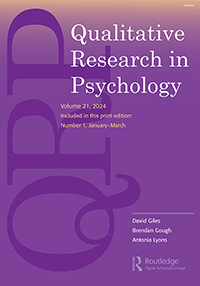Experienced qualitative researchers’ views on teaching students qualitative research design
IF 4.4
3区 心理学
Q1 PSYCHOLOGY, MULTIDISCIPLINARY
引用次数: 7
Abstract
ABSTRACT The increasing prominence of qualitative inquiry in psychological research has been accompanied by reflection on teaching and learning practices within undergraduate and postgraduate psychology courses. To date, there is limited empirical understanding of how experienced qualitative researchers approach teaching students about qualitative research design. The present study draws on interviews with qualitative researchers (N = 12) from multiple disciplines, occupying various positions within academia. Using thematic analysis, seven themes were developed, under the superordinate theme present qualitative research as a legitimate approach to enquiry. The themes illuminate practical pedagogical implications for teaching qualitative research, including introducing qualitative research in bite-sized chunks and initiating students to qualitative inquiry through foundational methods. The findings contextualise the teaching of qualitative methods as a site of multiple tensions, for example, balancing pragmatism and idealism, and providing structure to students while enabling flexibility. Educators and supervisors of qualitative research navigate these tensions in their teaching practice to provide students with what they see as the best possible learning experiences. We call for further research to build a profile of evidence-based pedagogical practice for teaching qualitative research, while also acknowledging the fluidity needed to embrace changing epistemologies, methodologies, methods, and data sources.资深质性研究者对教授学生质性研究设计的看法
随着心理学研究中质性探究的日益突出,对本科和研究生心理学课程教学实践的反思也随之而来。迄今为止,对于经验丰富的定性研究人员如何教授学生有关定性研究设计的经验理解有限。本研究采用了对来自多个学科的定性研究人员(N = 12)的访谈,这些研究人员在学术界占据着不同的职位。利用主题分析,开发了七个主题,在上级主题下,目前定性研究是一种合理的调查方法。这些主题阐明了教学定性研究的实际教学意义,包括在小块中引入定性研究,并通过基本方法引导学生进行定性探究。研究结果将定性方法的教学作为一个多重紧张的场所,例如,平衡实用主义和理想主义,在为学生提供结构的同时赋予灵活性。定性研究的教育者和管理者在他们的教学实践中应对这些紧张关系,为学生提供他们认为最好的学习体验。我们呼吁进行进一步的研究,以建立一个以证据为基础的定性研究教学实践的概况,同时也承认接受不断变化的认识论、方法论、方法和数据源所需的流动性。
本文章由计算机程序翻译,如有差异,请以英文原文为准。
求助全文
约1分钟内获得全文
求助全文
来源期刊

Qualitative Research in Psychology
PSYCHOLOGY, MULTIDISCIPLINARY-
CiteScore
20.00
自引率
0.50%
发文量
14
期刊介绍:
Qualitative Research in Psychology is an international, peer-reviewed journal that publishes high-quality, original research. It aims to become the primary forum for qualitative researchers in all areas of psychology, including cognitive, social, developmental, educational, clinical, health, and forensic psychology. The journal also welcomes psychologically relevant qualitative research from other disciplines. It seeks innovative and pioneering work that advances the field of qualitative research in psychology.
The journal has published state-of-the-art debates on various research approaches, methods, and analytic techniques, such as discourse analysis, interpretative phenomenological analysis, visual analyses, and online research. It has also explored the role of qualitative research in fields like psychosocial studies and feminist psychology. Additionally, the journal has provided informative articles on ethics, transcription, interviewee recruitment, and has introduced innovative research techniques like photovoice, autoethnography, template analysis, and psychogeography.
While the predominant audience consists of psychology professionals using qualitative research methods in academic, clinical, or occupational settings, the journal has an interdisciplinary focus. It aims to raise awareness of psychology as a social science that encompasses various qualitative approaches.
In summary, Qualitative Research in Psychology is a leading forum for qualitative researchers in psychology. It publishes cutting-edge research, explores different research approaches and techniques, and encourages interdisciplinary collaboration.
 求助内容:
求助内容: 应助结果提醒方式:
应助结果提醒方式:


